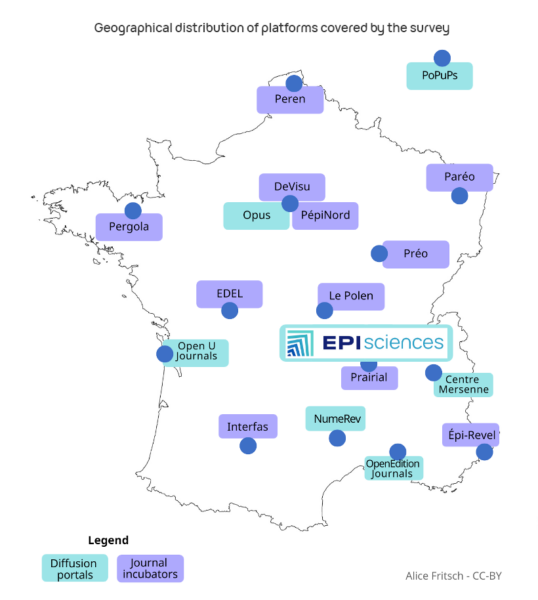As part of my Master’s 2 in “Digital Publishing” at the École nationale supérieure des sciences de l’information et des bibliothèques (Enssib), I spent four months at the CCSD, from March to July 2023, working in the Episciences team. During my internship, I carried out a comparative study of French open access scientific publishing platforms, across all disciplines, in order to assess the services offered by Episciences in terms of web hosting, editorial support and journal referencing.
The survey covered 18 platforms: 11 journal incubators – whose aim is to improve the quality of the journals they support so that, if they so wish, they can join national portals such as OpenEdition Journals – and 7 diffusion portals that host journals on a permanent basis. Episciences falls into this second category, providing a complete platform for editing and publishing journals in all disciplines, and providing technical and editorial support for publications. To identify the platforms, I notably relied on the Repères network, created in 2018 with the aim of cooperating and pooling resources between diamond open access scientific publishing platforms, of which 16 of the 18 platforms that took part in the study are members. This is why I included the Belgian PoPuPs platform in my survey.

The diamond open access scientific publishing landscape that I have studied is characterised by its heterogeneity, not only in terms of age, but also in terms of the number of journals supported and the range of services offered. Proposing a global model for a diffusion platform is proving to be complex, as each of them can be distinguished by certain specific features: this is also one of the recommendations of the Appel de Jussieu, which promotes support for bibliodiversity. The aim of this post is to highlight what distinguishes Episciences in particular from other diamond open access scientific diffusion platforms.
The Episciences platform, launched in 2013, currently hosts 26 journals, 25 of which are still publishing, making it the platform with the largest number of active journals in the sample studied, excluding OpenEdition Journals. In addition, while most platforms specialise in supporting journals in the humanities and social sciences, Episciences also supports journals in science, technology and medicine. Like some other platforms, Episciences also supports journals at the intersection of the research and professional worlds, such as Management & Organisations du Sport. The variety of journals supported by Episciences also lies in their geographical location; it is one of the only French platforms to offer both technical and editorial support to journals created abroad. To date, its catalogue includes journals published on every continent.
Operated by the CCSD and hosted in France at the CCIN2P3, it also stands out for its inclusion in the EOSC (European Open Science Cloud) and OpenAIRE catalogue of services, as part of the OpenAIRE Nexus project. The Episciences platform is thus a key element in supporting the opening up of science, in line with the ambitions of the European Union, by offering journal teams and researchers an innovative solution for disseminating scientific articles.
In terms of software solutions provided to editorial teams, Episciences also distinguishes itself by offering both an editorial workflow management tool and a complete publication website: in fact, only the Centre Mersenne and NumeRev have also set up in-house software combining these two functions. The platform not only makes it possible to host and distribute journals on a dedicated website, but also to organise the entire peer review and validation process for the scientific articles submitted, making it easier for the journals’ editorial teams, authors and reviewers to monitor publications.
But it is in the choice of publications model that the Episciences platform’s most striking originality lies. As the only French platform to operate on the overlay model, Episciences contributes to the development of preprints in open repositories, since the journals it supports draw their articles from the author manuscripts available in open repositories (to date: arXiv, HAL and Zenodo). By guaranteeing the scientific validity of articles through a peer-review process, whether blind or with open identities, Episciences contributes to a more transparent approach to scientific publishing – the different versions of articles are permanently available in open repositories – but also more immediate, as the author preprints are distributed immediately, before the end of the sometimes lengthy peer-review process.
Editor’s note: Alice Fritsch joined the CCSD team on September 11th as a member of the User Support and Assistance team.